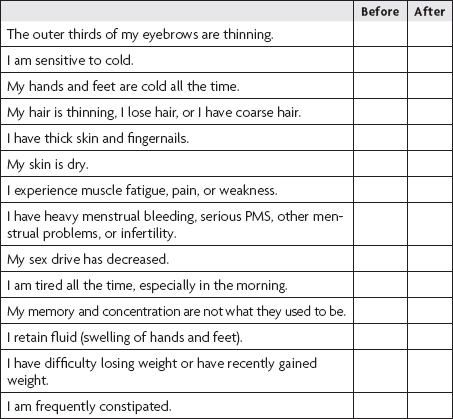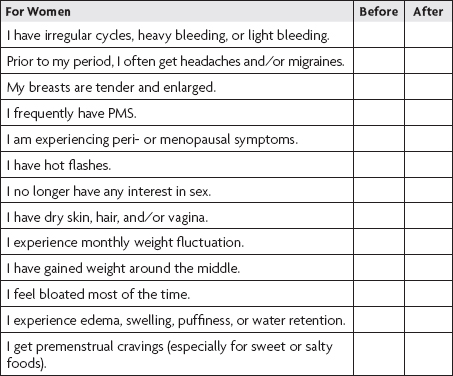

This book is mostly focused on the hormone insulin, but balancing all of your hormones, including sex hormones, adrenal or stress hormones, and thyroid hormones, is important if you want to heal. They are all interconnected; they interact with one another like a big musical symphony. When this symphony is playing out of tune, problems arise.
To overcome diabesity, you must identify and treat thyroid imbalances that control your metabolism; overactive stress hormones that worsen insulin resistance and blood sugar; and insulin imbalance and its harmful effects on your sex hormones. Let’s look at how each of these major hormonal imbalances can be contributing factors in diabesity.
Your thyroid controls your metabolism. If it is working slowly, your metabolism slows and your risk of diabesity goes up. Thyroid disease affects 1 in 5 women and 1 in 10 men, yet 50 percent of people with thyroid disease are undiagnosed. Undiagnosed thyroid disease worsens insulin resistance,1 and insulin resistance worsens thyroid function.2 Many who are diagnosed are treated inadequately with medications such as Synthroid.
Rene, a graduate student, was a serious and determined twenty-five-year-old woman who did everything she could to take care of herself. She ate a clean, whole foods diet rich in fruits and vegetables, nuts, seeds, beans, and whole grains, and she exercised an hour every day with a trainer. She got enough sleep and balanced work and play. But she had one problem. She was 20 pounds overweight and nothing she did seemed to matter. Digging into her story, I found some clues to the mysterious weight gain and insulin problems. Her periods were never regular, she had dry skin, she was constipated, her hair was coarse, and she was cold all the time. Despite seeing the best doctors in Los Angeles, no one had looked deeply into the obvious explanation for all those symptoms: low thyroid function. Of course, they did the standard thyroid test (TSH), but because the result of 3.5 was within the “normal” range, they didn’t look further.
I always give the full spectrum of thyroid function tests, including TSH (normal is now considered less than 3.5 by the American College of Endocrinology; however, most labs’ reference ranges have not been changed to reflect the new guidelines). I also check the thyroid hormone levels, T4 and T3, as well as the thyroid antibodies to see if there is an autoimmune reaction against the thyroid. Most physicians only check TSH, missing many people with subtler thyroid problems. Rene had a very low T3 and high thyroid antibodies, so even though her TSH was “normal,” I treated her with a natural thyroid hormone containing T4 and T3. All her symptoms went away, her periods became regular, and she lost 20 pounds.
Do you suffer from a sluggish, low-functioning thyroid? Take the following quiz and find out. Remember to take this quiz before you start the program and again after the six weeks are over to measure the “before and after” change in your health. You may need extra individualized support or natural thyroid replacement based on your scores; I explain this in Week 6 of the plan.
The thyroid gland is very sensitive to the effects of environmental toxins, infections, nutritional deficiencies (iodine, selenium, and zinc), and stress. One in five women and one in ten men have low thyroid function, and more than half don’t know it. The quiz below will help you self-diagnose hidden thyroid problems. For any symptom you have experienced in the last month, place a check in the “Before” box. Then find out how severe your problem is by using the scoring key below. Place a check in the “After” box after you’ve completed the six-week program to see how much you’ve improved.

If you scored over 3, I encourage you to follow the personalization steps for the thyroid in Week 6 of Part IV and to read my e-book, The UltraThyroid Solution (www.bloodsugarsolution.com/ultrathyroid), for more information on how to identify and treat thyroid disease.
Stress hormones also play a critical role in diabesity. Chronic stress increases the production of cortisol, the main stress hormone. Chronically elevated cortisol causes increased blood sugar and cholesterol, depression, and even dementia,3 and promotes the accumulation of belly fat that we so commonly see in patients with insulin resistance or diabetes. Too much cortisol also causes muscle loss, interferes with thyroid and growth hormones, and negatively impacts sleep, all of which promote weight gain. Sleep deprivation increases appetite and sugar cravings. In a study of healthy young men deprived of just 2 hours of sleep, their blood levels of ghrelin (the hunger hormone) increased and PYY (the brake on appetite) decreased.4 This made them crave and eat more refined carbohydrates and sugar. Getting enough quality sleep is important in the treatment of diabesity and can prevent weight gain, diabetes, and heart disease.
But even more important is decreasing our stress levels.
Stress is defined as a real or imagined threat to our body or ego. We will always have intermittent acute stressors. That can’t be avoided. But it is not the acute stress that comes and goes that causes problems with your health. What has such a dramatic impact on diabesity as well as on so many other chronic illnesses is the unremitting stress that is created, in part, by your attitude toward that stress: Do you believe that things will work out in the end? Do you see the glass as half empty or half full? Do you think the world a safe place or a dangerous place?
The effects of stress are shaped by our thoughts, attitudes, and beliefs. We can change what we think and believe, and we can reduce the impact of daily stress on our lives as a result. You shouldn’t believe every stupid thought you have!
In Chapter 14, “Step 7: Soothe Your Mind,” we further explore the links between stress and diabesity. You can also follow the additional personalization steps for calming the mind in Part IV as well as use my audio CD program UltraCalm (www.bloodsugarsolution.com/ultracalm), to help you relieve chronic stress with a few simple tools.
Too much insulin has a negative effect on your sex hormones. If you are a man, it makes you more like a woman, and if you are a woman, it makes you more like a man. Insulin resistance leads to hair growth on the face and body and loss of hair on the head in women. Many women also get acne and irregular menstrual cycles. It makes women grow a mustache or beard, go bald, and get pimples.
Insulin resistance can also be an unrecognized cause of polycystic ovarian syndrome,5 which causes infertility in women. This is a nutritional problem caused by our toxic diet and environment.
Lisa desperately wanted children. After failing treatment with the best infertility specialists in the New Jersey–New York area, she came to see me. Her doctors told her she had polycystic ovarian syndrome (PCOS), which is really a nutritional and metabolic problem that affects hormones. It is primarily caused by pre-diabetes. Symptoms include irregular or heavy periods, acne, facial hair, loss of scalp hair, and increased belly fat.
After pills and shots and hormone cocktails that pushed and prodded her ovaries to work properly, after multiple in vitro fertilization (IVF) attempts at $15,000 a pop, there was still no baby for Lisa. But the problem wasn’t her ovaries—it was her diet.
Three months after she transformed her diet from processed to whole, fresh, real foods and started exercising daily and taking nutritional supplements that support normal blood sugar metabolism, Lisa got pregnant naturally. And a year later I got a cute baby picture with a little note attached that said, “Thanks Dr. Hyman for getting me pregnant.” I wasn’t sure how to explain that to my wife! In fact, using the principles in this book, I have gotten many women pregnant, and my office wall is full of baby pictures.
Dr. Walter Willett of Harvard wrote about his research on infertility caused by pre-diabetes in The Fertility Diet. Researchers studied fertility in 19,000 women from the Harvard Nurses’ Health Study.6 They found that a majority of infertility, which affects one in seven couples, might be treated effectively through diet, lifestyle, and supplements. Fixing nutritional deficiencies by taking a multivitamin,7 and eating a whole-foods, low-glycemic-load, nutrient-rich, plant-based diet can have an enormous impact on fertility.
In addition, Dr. David Ludwig found that a low-glycemic-load diet prevented preterm labor in overweight women.8 So eating according to the plan in this book can help you not only get pregnant but stay pregnant.
Steve, a fifty-four-year-old author, is another patient who couldn’t seem to lose weight. Despite working aggressively with a trainer three to five days a week doing strength training and aerobics, he couldn’t get his appetite under control, build muscle, or lose any of the considerable belly fat that hung around his 285-pound body. His sex drive was low and erections were weak. We found that he had sky-high insulin levels but rock-bottom testosterone levels.
By improving his diet and applying some topical bioidentical testosterone gel, he was able to build muscle, lose weight, control his appetite, and resume having sex with his beautiful wife.
In men, insulin resistance drives down testosterone levels.9 Sex drive and sexual function are significantly impaired as a result. Low testosterone also leads to other problems, such as decreased muscle mass and more fat deposition in the belly, seen in all those big guts in men over forty years old. Over time, diabetic men become more like women because insulin and excess body fat result in a higher estrogen level, leading to soft skin; increased breast size; loss of hair on the legs, arms, and chest; loss of muscle mass; low sex drive; and trouble getting erections.
Are your sex hormones out of balance? Take the quiz below to find out. Remember to take this quiz before you start the program and again after the six weeks are over to measure the “before and after” change in your health. You may need extra individualized support based on your scores; I explain this in Week 6 of the plan.
Many symptoms people suffer from are related to imbalances in their sex hormones. Men and women each respond differently to those imbalances. Take the appropriate quiz to find out if hormonal imbalances are making you miserable. For any symptom you have experienced in the last month, place a check in the “Before” box. Then find out how severe your problem is by using the scoring key below. Place a check in the “After” box after you’ve completed the six-week program to see how much you’ve improved.

If your sex hormones are out of balance, the problem is likely related to increased insulin resistance. These imbalances are completely reversible through The Blood Sugar Solution.